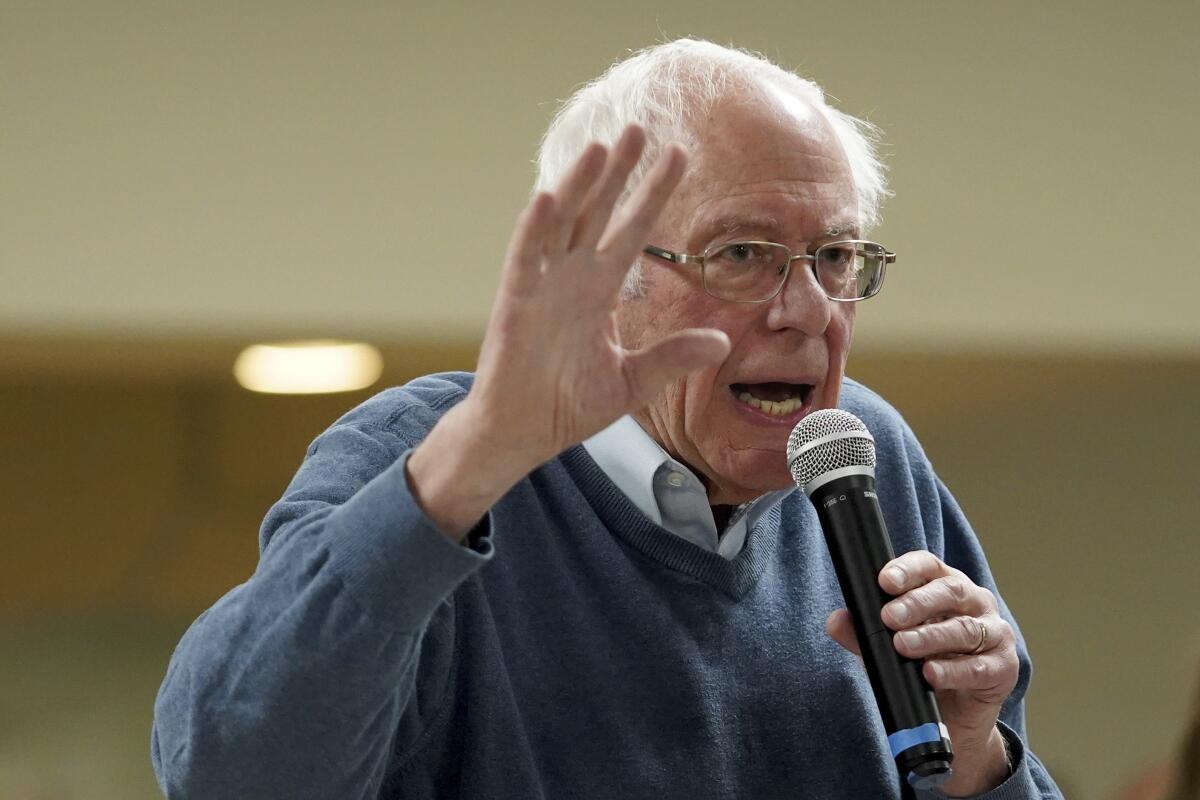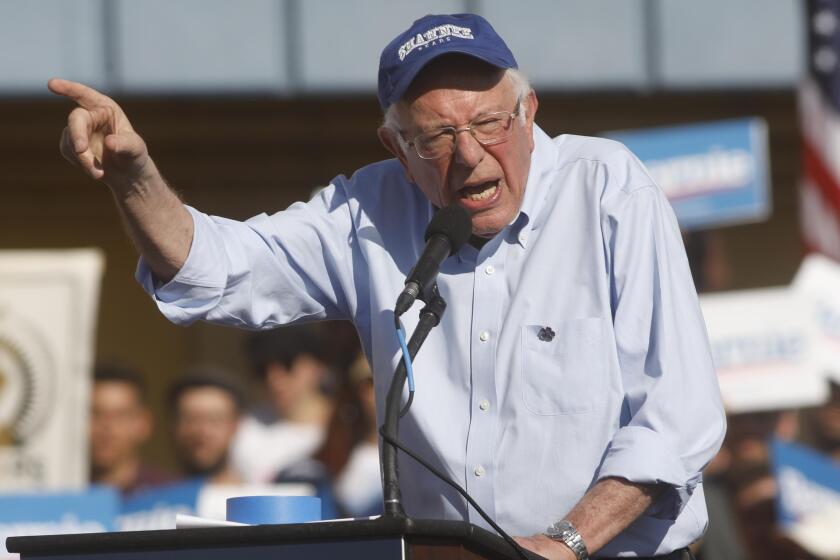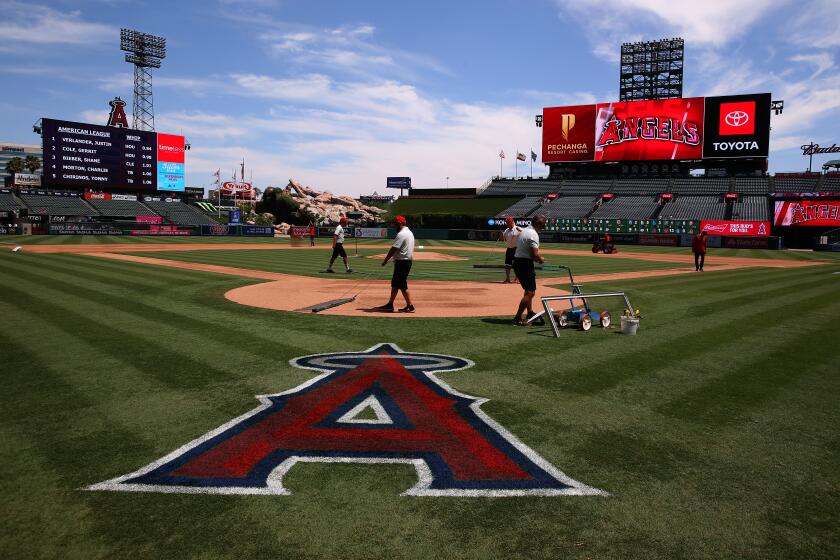Bernie Sanders is on a crusade to save 42 minor league baseball teams

- Share via
Bernie Sanders called. He was talking baseball, and you could hear the passion. The Dodgers were his team when he grew up in Brooklyn, watching Jackie Robinson play. He did not want to talk about whether Clayton Kershaw might finally win a World Series, or whether the Dodgers should pay up for Gerrit Cole or Anthony Rendon.
The Dodgers are not his team anymore. They broke his heart when they moved to Los Angeles.
He was 16. There was nothing he could do about it.
The pain of a community losing its team still resonates with him, decades later. He was the mayor of Burlington, Vt., in 1984 when the city landed a minor league team. When he learned last month that major league owners wanted to kill the team, he could do something about it. As a United States senator and candidate for president he could raise hell about it.
The Vermont Lake Monsters are among 42 teams that major league owners have targeted for elimination. The owners say they want to streamline player development, improve facilities, ease travel burdens and improve working conditions for prospects most likely to reach the major leagues. For every team that would be lost, Major League Baseball promises to work to replace it with a team in a college summer league, or in a last-chance independent pro league.
That is no consolation to small towns that delight in their affiliation with a major league team and a chance to see a future major league star. Every one of those small towns has a representative in Washington.
Bernie Sanders cited the Dodgers’ Enrique Hernández in a statement in support of Lancaster JetHawks, one of 42 minor league teams that may be eliminated.
Congress has formed a task force to oppose the plan. Sanders, a democratic socialist, and Rep. Kevin McCarthy (R-Bakersfield), the House minority leader, are among more than 100 members of Congress who have signed letters urging MLB Commissioner Rob Manfred to back off.
Sanders met with Manfred this week. And, with representatives from MLB and the minor leagues scheduled to meet Friday in San Diego, Sanders has one message for Manfred and the MLB owners: I’m not looking for a compromise where you reduce the number of teams that you kill. I’m asking you to kill the whole plan.
Here is how the question-and-answer portion of the phone call with the Los Angeles Times went:
Can you recall any other issues on which you have been aligned with Kevin McCarthy?
Probably not too many (laughter). I think that’s fair to say.
Let me just say a few words.
Go ahead.
Some 30 years ago, I helped bring minor league baseball — it was a double-A team affiliated with the Cincinnati Reds — to Vermont. What I saw with my own eyes is what minor league baseball does to a community. It is especially gratifying to see kids go out to the ballgames, families able to afford the relatively low price of tickets, and kids get autographs from the players. There’s just a huge amount of excitement and community spirit.
I was very distressed to hear that major league baseball wants to eliminate baseball in 42 communities, including Burlington, Vermont, where we now have a lower-level team associated with the Oakland A’s. I think what we have to appreciate is that major league baseball is not just a business. It is called the national pastime for a reason.
We have a situation today where Major League Baseball is mostly owned by a group of billionaires, people who have tremendous wealth. Last year, Major League Baseball made nearly $1.2 billion in profits, up 38% from the previous year. It is a business that uniquely receives an antitrust exemption from the United States Congress and over the years has received many hundreds of millions of dollars in corporate welfare from communities all over this country where taxpayers build stadiums for their owners. So this is a business that must respond to the needs of the American people, and you cannot do that — they should not do that — by shutting down baseball in 42 communities around this country.
One of those 42 teams is in Lancaster, and you issued a statement in support of the JetHawks. Do you know anything specific about that team or that area?
I don’t. I believe I am speaking for 42 communities around this country.
Did you meet with the commissioner at his invitation?
No. We reached out to him, and he accepted.
You put out a statement after the meeting. So did he. Each of you emphasized your areas of concern. But do you believe you made any progress toward resolving the dispute?
I hope. Representatives from minor league baseball will be meeting with Major League Baseball in San Diego, and I do hope what Major League Baseball will do is sit down and negotiate seriously, and they will take off the table this simply outrageous idea that they can simply shut down these 42 teams around the country that are so important to those communities. That demand should be taken off the table, and the major and minor league organizations can come to an agreement.
Every time something happens in baseball that gets the attention of Congress, the possibility is floated that Congress might take away baseball’s antitrust exemption. That never happens. Why should baseball be concerned that it actually might this time?
The Congress of the United States has given a great deal to Major League Baseball, and Major League Baseball owes consideration to the people of this country not to shut down 42 teams. All I can say is that I have the feeling I am not just speaking for myself, as a United States senator from Vermont. I think you will find many, many members of the House and the Senate who are prepared to take a hard look at that issue if Major League Baseball moves forward and shuts down baseball in 42 communities.
The Angels-Anaheim deal keeps the team in town through 2050. A company affiliated with Angels owner Arte Moreno will buy the stadium and surrounding parking lots for $325 million.
Do you believe this issue is emblematic of other issues you see in your campaign? The impetus for this proposal is efficiency for the owners: better player development with fewer players. That might be great for them, but not so great for those communities.
That’s right. Once you are talking about a small number of incredibly wealthy people — a number of them are actually billionaires — who are making huge amounts of money. Apparently, what they want is to make even more money, even if it means taking minor league baseball away from 42 communities around this country. We call that corporate greed, when very wealthy and powerful people could care less about the communities, and 1,200 young ballplayers, and all they are interested in is increasing their profits.
I object to that in any business, and any corporation. But major league owners have got to understand that this is not just a profit-making business. This is something that millions and millions of people, and kids, think about, pay attention to, and feel strongly about. This is — quote, unquote — the national pastime.
Did you ever have a chance to meet Bud Selig, the commissioner that preceded Manfred?
I did not.
One of the things he liked to say was that baseball is a social institution with important social responsibilities. Do you believe this is falling short of baseball’s mission on that score?
Absolutely. He is, of course, right. Baseball is a social phenomenon. It brings people together, from all kinds of backgrounds and races and religions. I grew up in Brooklyn, and I can tell you how important the Brooklyn Dodgers were to Brooklyn, in so many ways. I’m sure it is true in communities all across this country.
So baseball cannot be looked at as another business, to make as much money as possible, especially given the fact they made $1.2 billion in profits last year. That’s pretty good. And you don’t have to shut down minor league teams in order to make a bit more. They should pay attention to the needs of those communities, the fans in those communities, and the city governments that have supported local baseball. That’s the message that I will be conveying to major league owners.
More to Read
Go beyond the scoreboard
Get the latest on L.A.'s teams in the daily Sports Report newsletter.
You may occasionally receive promotional content from the Los Angeles Times.













